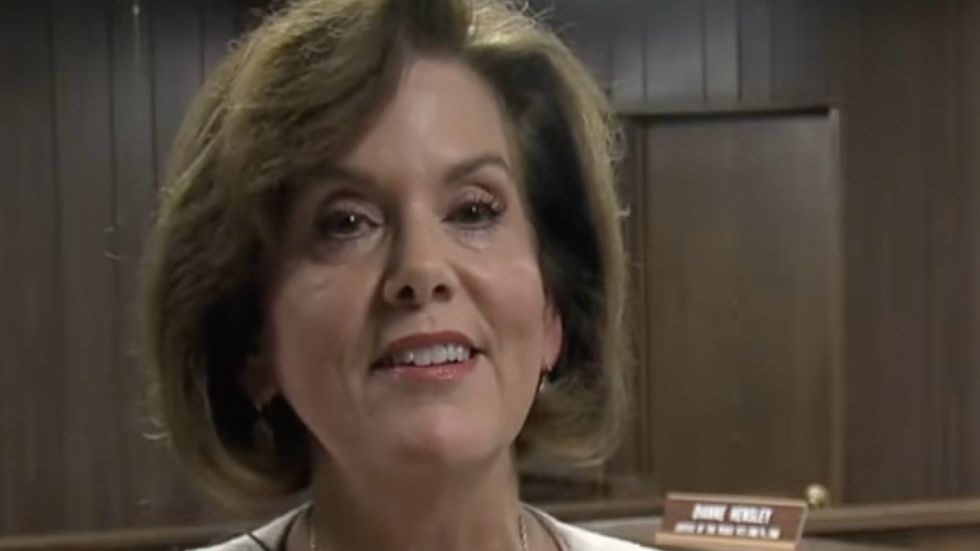A Texas justice of the peace who was disciplined for refusing to marry same-sex couples will go before the state’s Supreme Court Wednesday.
Dianne Hensley is a justice of the peace in McLennan County, located in central Texas; Waco is the county seat. After the U.S. Supreme Court ruled for nationwide marriage equality in the Obergefell v. Hodges case in 2015, she stopped officiating weddings altogether for a time, as she said performing same-sex marriages would be incompatible with her conservative Christian faith. She held this belief even though she had a gay brother, now deceased. The following year, she resumed performing marriages for opposite-sex couples, while same-sex couples who came to her office were given a list of alternative officiants, some nearby, some not.
After a newspaper article about her appeared in 2017, the State Commission on Judicial Conduct began an investigation of her actions. A justice of the peace is considered the same as a judge. In 2019, the commission reprimanded her and put out a warning saying she might not be impartial when it came to matters of sexual orientation. She filed suit against the commission, contending the reprimand violated her rights under Texas’s religious freedom law, and once again stopped performing marriages.
A trial court dismissed her suit, and last year the Texas Court of Appeals upheld that. The law bans only “threatened or continued violation” of a person’s religious practice, and Hensley had received a single reprimand, the appeals court judges said. The commission was acting within its rights and was shielded from lawsuits by sovereign immunity, the legal doctrine that a governmental body can’t be sued without its consent, they added.
She then appealed to the Texas Supreme Court, which is now set to hear the case. “It feels almost anticlimactic” after so many years, she recently told The Dallas Morning News.
In the wide-ranging interview, she discussed the development of her religious beliefs and her relationship with her brother. She said she wasn’t particularly religious until her stepson, who was a difficult child, attended a Christian summer camp and his behavior improved markedly. Hensley determined, “OK, we need religion. I’m going to go get some religion,” she told the Morning News. She and her family began attending a nondenominational Christian church. “That’s when I really developed a relationship with the Lord, and I found things that had troubled me for years suddenly made sense,” she said.
Her older brother, who was gay, became estranged from their parents because of money matters and lived overseas for several years, she said. She helped him rebuild his relationship with the family, and they never discussed the fact that he was gay, but she knew he was “from the company he kept,” she said. Before he died of ALS, she got to know some of his friends, including a gay man named Michael.
“When Michael got married, he did not call me to [perform the marriage] because he respected my faith,” she said in the interview. “I think that’s how most people are. Most people just want to live and let live.”
However, Hensley, informed by her faith, has been a longtime activist against LGBTQ+ rights. In the 1990s, working for Concerned Women for America, she campaigned for abstinence-only sex education in schools. In 2005, she testified before the Texas Senate in favor of a state constitutional amendment banning same-sex marriage, which was eventually passed overwhelmingly by voters. She claimed that children raised by same-sex couples had more problems later in life than those raised by opposite-sex parents (research has shown this to be untrue).
She ran for the Texas House in Republican primaries in 1996 and 2000, losing both times. She was elected as a justice of the peace in 2014 and reelected last year.
In her lawsuit, she is represented by Texas-based First Liberty Institute, a right-wing nonprofit where anti-LGBTQ+ U.S. District Judge Matthew Kacsmaryk was once an attorney, and Jonathan Mitchell of Mitchell Law, who is a prominent crusader against LGBTQ+ rights, abortion rights, and access to HIV prevention drugs.
This summer, Mitchell filed a brief with the Texas high court arguing that the U.S. Supreme Court’s ruling in 303 Creative LLC v. Elenis should bolster Hensley’s case. The 303 Creative ruling held that despite Colorado’s antidiscrimination law, a web designer in the state was within her rights to refuse to create wedding websites for same-sex couples. That ruling was based on the designer’s free speech rights under the U.S. Constitution, while Hensley’s case is based on Texas’s religious freedom law, but Mitchell contended the 303 Creative decision “is nonetheless instructive because it rejects the idea of a ‘compelling interest’ in forcing wedding vendors to participate in same-sex and opposite-sex marriage ceremonies on equal terms.”
Texas Attorney General Ken Paxton, another longtime opponent of LGBTQ+ equality, has refused to defend the judicial commission in the suit. Private lawyers are defending the commission instead.














































































